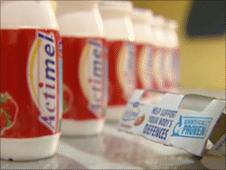EU health food claims law begins to bite
- Published

Under the rules, companies like Danone must satisfy the authorities claims are scientifically proven
Health foods would be nothing without the claims they make on the packaging.
But some claims might soon vanish, due to a European regulation which demands that health food companies come up with the scientific evidence to back their labelling.
The regulation extends to a vast range of products - from multi-vitamins and slimming pills to margarine and yoghurt.
Of the claims so far considered, the overwhelming majority have been rejected, leaving many health food manufacturers with a very bad case of indigestion.
Probiotics scrutinised
The was adopted back in 2006 "to ensure that consumers are not misled by unsubstantiated, exaggerated or untruthful claims about foodstuffs", but it is only now that it is beginning to bite.
European Union member states have together submitted over 44,000 'general function' health claims on the part of manufacturers. These were boiled down to 4,637 claims for consideration by the Parma-based European Food Safety Authority (EFSA). Of around 900 claims so far examined, a massive 80% have been rejected.
Further claims have been submitted from individual manufacturers seeking opinions on proprietary products. There are also separate claims relating to disease reduction and children's development. Again, most applications have been rejected.
Among those claims thrown out (see box) is the suggestion that green tea is good for blood pressure, cholesterol levels, bones and teeth or that it works as an antioxidant, reducing the effects of ageing.
Also reeling is the lucrative probiotic drinks and yoghurts industry, with claims linked to a host of probiotic strains rejected.
Probiotic giant Yakult still awaits EFSA's final judgement, having withdrawn an earlier application. Danone (maker of Actimel and Activia) has withdrawn applications twice and expressed its frustration with the process.
Neil Bowdler reports on the stringent new health foods rules
Ioannis Misopoulos, director general of the International Probiotics Association (IPA), is openly hostile.
"It can take three years to get these kinds of human studies together but in the meantime the claims are going to be wiped away," he said. "The regulation is killing this industry and the job losses are already being felt."
Threat to brand names
The regulation also bans the practice of claiming a product will result in a quantifiable weight loss, so out will go the promise of losing so many pounds in a week, as will "claims referring to recommendations of individual doctors".
The regulation does not just touch the claims in the ad or in the small print - it also extends to the product names if they are deemed to constitute a claim, even if established brands will have 15 years to comply. What then for such well known names as Slim Fast?
According to Helen Darracott, a regulatory expert with the UK healthcare trade body, the Proprietary Association of Great Britain, a name change may be on the cards.
"The actual name of the product is a health claim in effect - it slims and it does it quickly - and therefore it's a claim which talks about the rate of weight loss so this will actually fall foul of the regulation."
Not surprisingly, the process has left many manufacturers here in the UK angry. Some say EFSA is demanding the same kind of clinical evidence which prescription medicines would require.
"EFSA is rejecting most of the proposed food supplement claims," says Jenny Baillie of the York-based health foods company Power Health, "even established claims like cranberry for urinary tract health, which will mean that there will be no information on packs for the consumer to assess what the product is supposed to do."
She believes the regulation may even drive consumers into buying from less reputable sources.
"People will probably start buying in from unregulated countries especially via the internet and we could well end up with customers less protected than they were right at the start of this process."
Other larger companies are keeping their silence for now. Yakult and Holland & Barrett declined requests for interviews on the effects the regulation may have on their business.
Unilever, which produces such health brands as Flora pro.activ and Slim Fast, also declined an interview request, but released a statement defending Slim Fast and saying the new regulation would provide a scientific standard and enable "consumers to make informed and meaningful choices they can trust".
Second chance
What is certain is that this process is set to run and run. EFSA is still to rule on thousands of claims, with the next batch of opinions due in late September.
Even when claims are rejected, it may be some time before companies actually drop them from their packaging. EFSA's opinions must first be adopted by the European Commission and companies will have six months to comply.
The European Commission has now also signalled companies may be given a second chance to submit rejected claims, after acknowledging that this is a new process with which many companies have struggled.
EFSA spokeswoman Lucia de Luca says insufficient scientific evidence - or inadequate information - is to blame for the most of the rejected claims.
"For example, antioxidant claims did not provide actual evidence of an effect on the protection of DNA, proteins and lipids from oxidative damage - which would be considered to be a beneficial physiological effect," she says.
"To carry out a scientific evaluation of the health claim, the relationship between the benefit claimed and the substance or product has to be clear."